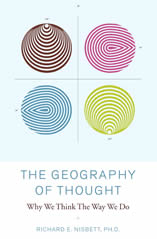|
|
Selected
Publications
Richard E. Nisbett
|

Culture of Honor: The Psychology of Violence in the South
Culture of Honor shows that the U.S. South is more violent than the North. The greater violence is limited to situations where there has been an insult or a threat to home or property. Laboratory experiments show that southerners respond with more anger and greater increases in testosterone and cortisol levels when insulted than do northerners and surveys show they feel that violence is an appropriate response to insult or threat to property. Field experiments show that southerners are more accepting of other people who have killed to protect their honor than are northerners. This pattern of sensitivity to insults and threat is found in cultures throughout the world and is particularly common where there is a tradition of earning a living by keeping herds of animals. When this is the case, the individual risks the possibility of losing all his wealth by theft. A stance of toughness and unwillingness to brook any threat or insult is an effective way of making it clear that it would be unwise to steal from him. The U.S. South was founded mostly by herding peoples from Scotland and Ireland and the U.S. North was founded mostly by farming peoples from England, Holland and Germany.
Click here to buy it on Amazon.com.
|
|

The Geography of Thought: Why We Think the Way We Do
The Geography of Thought
shows that East Asia and the West have had different systems of thought, including perception, assumptions about the nature of the world,
and thinking processes, for thousands of years. Ancient Greek philosophers were "analytic" — objects and people are separated
from their environment, categorized, and reasoned about using logical rules. Psychological experiments show the same is true of
ordinary Westerners today. Ancient Chinese philosophers and ordinary East Asians today share a "holistic" orientation —
perceiving and thinking about objects in relation to their environments and reasoning dialectically, trying to find the Middle Way between
opposing propositions. Differences in thought stem from differences in social practices, with the West being individualistic and the East
collectivistic.
Click here to buy it on Amazon.com.
|
|

Intelligence and How to Get It:
Why Schools and Cultures Count
Who is smarter, Asians or Westerners? Are there genetic explanations for group differences in test scores? How can parents work to improve their child's intelligence? Can schools eliminate the social class and racial gaps in academic achievement?
The book argues that intellect is not primarily genetically determined but is principally influenced by societal factors.
There is a need to revamp our entire approach to education, because malleable, controllable factors like schools and social environment,
and not hard-wired genetic codes, hold the keys to the future of intellectual advancement.
Click here to buy it on Amazon.com.
|
Nisbett, R. E. (1990). The anti-creativity letters: Advice from
a senior tempter to a junior tempter. American Psychologist,
45, 1078-1082. PDF of
final manuscript. |
| Nisbett,
R. E. (1998). Race, genetics, and IQ. In C. Jencks and M. Phillips
(Eds.) Black-White Test Score Differences. Washington,
D. C.: Brookings Institution. PDF
of final manuscript. |
| Peng,
K., & Nisbett, R. E. (1999). Culture, dialecticism, and reasoning
about contradiction. American Psychologist, 54, 741-754.
PDF of final manuscript. |
| Choi,
I., Nisbett, R. E., & Norenzayan, A. (1999). Causal attribution
across cultures: Variation and universality. Psychological
Bulletin, 125, 47-63. PDF
of final manuscript. |
| Sanchez-Burks,
J., Nisbett, R. E., & Ybarra, O. (2000). Cultural styles, relationship
schemas, and prejudice against outgroups. Journal of Personality
and Social Psychology, 79, 174-189. PDF
of final manuscript. |
| Ji,
L., Peng, K., & Nisbett, R. E. (2000). Culture, control, and perception
of relationships in the environment. Journal of Personality
and Social Psychology, 78, 943-955. PDF
of final manuscript. |
| Masuda,
T., & Nisbett, R. E. (2001). Attending holistically versus analytically:
Comparing the context sensitivity of Japanese and Americans. Journal
of Personality and Social Psychology 81, 992-934. PDF
of final manuscript. |
Nisbett, R. E., Peng, K., Choi, I., & Norenzayan, A. (2001). Culture
and systems of thought: Holistic vs. analytic cognition. Psychological
Review, 108, 291-310. PDF
of final manuscript. |
Ji, L., Nisbett, R. E., & Su, Y. (2001). Culture, change and prediction.
Psychological Science, 12, 450-456. Follow the directions
off their website to obtain the article from archives. |
| Hedden,
T., Park, D. C., Nisbett, R. E., Ji, L., Jing, Q., & Jiao, S.
(2002). Cultural variation in verbal versus spatial neuropsychological
function across the lifespan. Neuropsychology, 16, 65-73.
PDF of final manuscript. |
| Norenzayan,
A., Choi, I., & Nisbett, R. E. (2002). Cultural similarities and
differences in social inference: Evidence from behavioral predictions
and lay theories of behavior. Personality and Social Psychology
Bulletin, 28, 109-120. PDF
of final manuscript. |
Nisbett, R. E. and Norenzayan, A. (2002). Culture and cognition.
In D. Medin & H. Pashler (Eds.), Stevens' Handbook of Experimental
Psychology, Third Edition, Volume Two: Memory and Cognitive Processes.
New York: John Wiley & Sons. PDF
of final manuscript. |
Norenzayan, A., Smith, E.E., Kim, B. J. & Nisbett, R. E. Cultural
preferences for formal versus intuitive reasoning. (In press).
Cognitive Science. PDF
of final manuscript. |
|